|
|
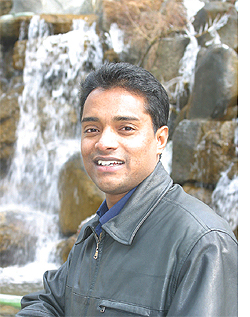 Introducing Jeung San Do to my Indian compatriots was my most important reason for making the journey. I think it was a blessing from God for me to have the chance to introduce Jeung San Do to India, an internationally well-known nation, the world’s largest democracy, and the second-largest country in terms of population. I prayed to God to have His grace to be able to do my duty successfully.
Introducing Jeung San Do to my Indian compatriots was my most important reason for making the journey. I think it was a blessing from God for me to have the chance to introduce Jeung San Do to India, an internationally well-known nation, the world’s largest democracy, and the second-largest country in terms of population. I prayed to God to have His grace to be able to do my duty successfully.
Telling my brother-in-law about Jeung San Do in detail, I started my pogyo service in New Delhi, the capital city of India. I spoke at length over my three days there about Jeung San Do, the disasters that were going to occur in the future, and our duties to society. My brother-in-law, who realized that what I told him was absolutely right and true, became my first assistant in Delhi and helped perform pogyo activities.
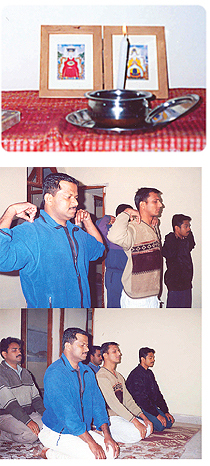 After speaking to a number of capable people amongst our friends and neighbors, I arranged a party at my home for them. Fifteen people came and participated in the events of that day. Among them I selected five people who showed sincerity and an enthusiasm to learn more about Jeung San Do. I gave copies of 『Gaebyeok Magazine』 and 『Dance of the Dragon and Phoenix』 to everyone. All of us practiced the Taeeulju Mantra twice that day together. I have now arranged facilities for meditation and for teaching at my home. Now there are people frequently visiting my home to learn more about Jeung San Do.
After speaking to a number of capable people amongst our friends and neighbors, I arranged a party at my home for them. Fifteen people came and participated in the events of that day. Among them I selected five people who showed sincerity and an enthusiasm to learn more about Jeung San Do. I gave copies of 『Gaebyeok Magazine』 and 『Dance of the Dragon and Phoenix』 to everyone. All of us practiced the Taeeulju Mantra twice that day together. I have now arranged facilities for meditation and for teaching at my home. Now there are people frequently visiting my home to learn more about Jeung San Do.
Though I tried my best to place an advertisement about Jeung San Do in the Hindi newspapers (Hindi is the official language of India), I did not succeed because of a legal problem.
To make the maximum number of people aware of Jeung San Do was my ultimate goal while I was home. To accomplish this, I approached the famous ‘Dayal Singh Library Trust Society’ in New Delhi. After talking with the librarian about opportunities to make more and more people aware of Jeung San Do, I presented the library with a number of books, including the 『Dojeon』, 『Gaebyeok Magazine』, 『Dance of the Dragon and Phoenix』, and 『The Jade Flute』, so that these texts would be freely available to people visiting the library.
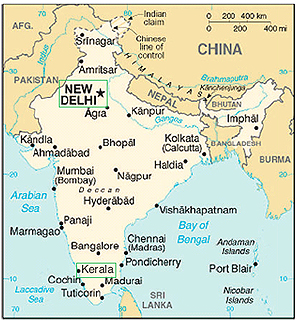 After I left Delhi, I proceeded to introduce Jeung San Do to the people of Kerala, the southernmost province of India. There, the official provincial language is Malayalam. Kerala, rich with natural beauty, is commonly known as ‘God’s own country.’ The province generally comes in first place in education, and traveling there by train from Delhi takes three days journey.
After I left Delhi, I proceeded to introduce Jeung San Do to the people of Kerala, the southernmost province of India. There, the official provincial language is Malayalam. Kerala, rich with natural beauty, is commonly known as ‘God’s own country.’ The province generally comes in first place in education, and traveling there by train from Delhi takes three days journey.
Here, too, I selected people from my circle of friends and acquaintances. It took me two to three talks to find people that were interested. We then got together with this company of interested participants each evening to speak more about Sangjenim and Taemonim’s teachings, and I spent time helping to answer their questions and clear up their doubts. This is where my intimate friends first came to learn about the teachings of Jeung San Do.
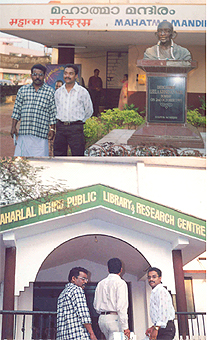 While in Kerala province, I selected the well-known Mahatma Mandiram Library and the Jawaharlal Nehru Public Library and Research Center as places where I could deliver our message in an effective way to the Malayalees (the people of Kerala). I gave a speech at the Mahatma Mandiram Library first, and my subject was: “What Is Jeung San Do and For What Does It Stand?” The librarian at the Mahatma Mandiram Library accepted the Dojeon, Gaebyeok Magazine, Dance of the Dragon and Phoenix, and The Jade Flute from me for the patrons of the library. Now, all people in need can borrow and read our English-language publications there.
While in Kerala province, I selected the well-known Mahatma Mandiram Library and the Jawaharlal Nehru Public Library and Research Center as places where I could deliver our message in an effective way to the Malayalees (the people of Kerala). I gave a speech at the Mahatma Mandiram Library first, and my subject was: “What Is Jeung San Do and For What Does It Stand?” The librarian at the Mahatma Mandiram Library accepted the Dojeon, Gaebyeok Magazine, Dance of the Dragon and Phoenix, and The Jade Flute from me for the patrons of the library. Now, all people in need can borrow and read our English-language publications there.
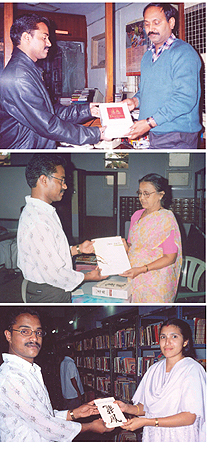 Next, I turned to the Jawaharlal Nehru Public Library and Research Center. Here, it took great efforts to awaken these people to Jeung San Do’s teachings. But finally, at last, they too agreed to receive our publications with an open heart. With great enthusiasm, I donated another copy of each of our publications. Unfortunately, I couldn’t provide them with a sufficient number of Dojeon copies because there only remained a few copies with me in India, but I assured them that I would send more at the earliest possible time.
Next, I turned to the Jawaharlal Nehru Public Library and Research Center. Here, it took great efforts to awaken these people to Jeung San Do’s teachings. But finally, at last, they too agreed to receive our publications with an open heart. With great enthusiasm, I donated another copy of each of our publications. Unfortunately, I couldn’t provide them with a sufficient number of Dojeon copies because there only remained a few copies with me in India, but I assured them that I would send more at the earliest possible time.
Most people in Kerala make a habit of reading the newspaper every day. This was why I believed the Malayalam newspapers could do a great deal to bring about interest in Jeung San Do and its publications. Thus, I placed an advertisement in the Deepika (a Malayalam daily). I took care to make the ad very attractive, and I provided a contact address and telephone number for the convenience of those interested in learning more.
It was quite by chance that I selected Deepika for our advertisement ‘deepika’ in Malayalam means “one which throws light.” Therefore, because of the grace of God, our message itself may become a lamp to many.
In Kerala, the ladies showed a greater enthusiasm than their male counterparts about learning Jeung San Do. I found sixteen people within a few short days and visited many of their homes. Most of the time, we had group discussions because of time constraints.
The most notable thing about my experiences in Kerala was that I had the opportunity to bring Smt. Prasanna to our Jeung San Do discussions. I think that her arrival greatly benefited my activities in Kerala. She had been a member of the Sree Sree Ravisankar Religion Center’s famous “Art of Living” course and had been practicing meditation for the last four years. She said this system has been very useful to her. Nonetheless, I requested that she try Taeeulju Mantra meditation and she agreed. After practicing this meditation method on two short occasions, she said, “Taeeulju Mantra meditation is very powerful and effective.”
Now, she spends much of her time studying and reading the articles found in our books. I didn’t forget to present her with a copy of the Dojeon as a sign of my happiness. She promised me that she would do all her best to open a meditation center in Kerala and to make more Indians aware of Jeung San Do. We have begun to translate our publications into the various Indian languages. I truly hope that we can publish our articles in Hindi and Malayalam in the nearest future.
My motto is: Get the message of Jeung San Do to more and more people as fast as possible.
I am grateful to Sangjenim and Taemonim for giving me the opportunity to do a little for the virtue of my people.


 Jeung San Do Terms
Jeung San Do Terms 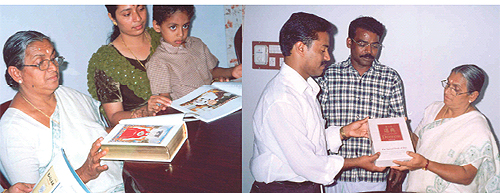
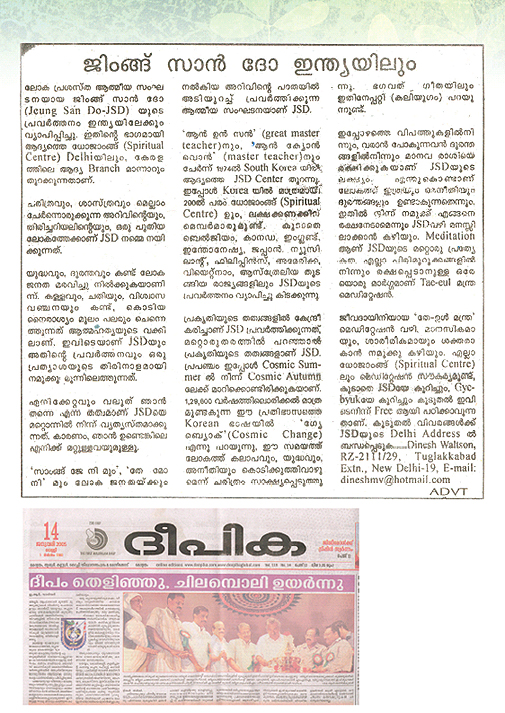
 증산도 JeungSanDo (English)
증산도 JeungSanDo (English)